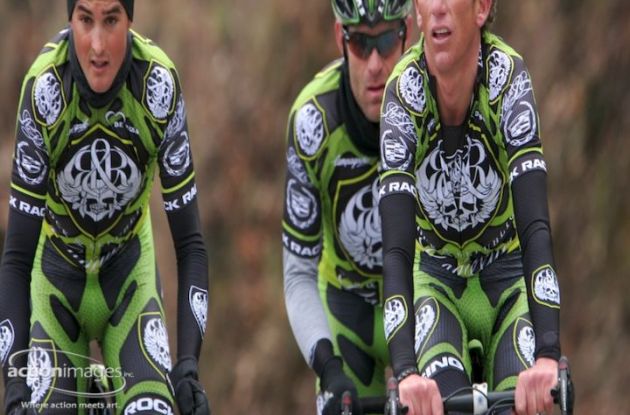Things I Wish to Forget
Ghosts from the past are coming back to haunt us.
We all forget about stuff. Do you always remember to change the oil in your car at exactly 3,000 miles? How about returning that DVD to Blockbuster? Yeah, we've all been there at one point. But there's a couple of stories that, in the excitement of the start of the new season, I've forgotten about.
Remember way back when Saxo Bank's Alberto Contador was suspended? Yeah, that seems like forever ago. You might have forgotten that Contador's WorldTour points make up two-thirds of his team's total. And with his suspension there goes the team's points as well. As a result the squad could get bounced out of the WorldTour. This is a long way to fall for team manager Bjarne Riis whose previous squads have achieved victories in Grand Tours, Classics, and were a dominant force on the circuit.
Velonation reminds us that six weeks ago Riis went before the UCI's license commission to see if his Team Crotch Eagle would be allowed to race with the big boys in spite of his team now lacking the required points. So far there's been zero movement from the UCI on this subject. And to make matters worse Team Saxo Bank has only earned two UCI points so far this season. Ouch...
While the Saxo Bank story was something I forgot about, Spanish rider Oscar Sevilla also completely dropped off my radar. Last I had heard he was suspended for six months for testing positive for hydroxyethyl starch, which can be used to mask EPO. Regardless, he has served that ban (which the UCI wants to lengthen to two years) and he won the Vuelta Mexico Telmex. I didn't even realize he had returned to racing.
In a report on Cyclingnews Sevilla was happy for the win and thanked the usual people but he should really have given a shout-out to his buddies in the Spanish cycling federation for letting him off the hook with only a six month sentence. Sevilla should have at least sent a nice fruit basket.
It was well over a year ago I interviewed Michael Ball, the controversial owner of Rock Racing, about the Rock Team being resurrected from the ashes. He told me that while the team wasn't going to be a pro squad - they would still race as amateurs, but riders would receive some type of compensation. The head spins at the thought of how he was going to pay the riders (Rock & Republic jeans, past their prime models, miscellaneous pharmaceuticals found underneath the sofa?) but one of those riders was the baby-faced Sevilla. That "team" never came to fruition and Sevilla now rides for a Colombian amateur squad.
While European racing had its own "dark period" the Michael Ball era is the United States' own version. Hiring shady riders, making empty promises and leaving riders in the lurch when it came time to get paid, was part of the Michael Ball legacy in cycling. I'm all for shaking up the system, which Ball wanted to do, but his methods were very questionable. I'm actually glad to forget about Ball. Let's promise to never speak of him again, okay?
One topic I also wish I could forget about is doping.
Earlier this month Spanish police arrested Colombian doctor Alberto Beltrán Niño as part of Operation Skype. At the time of his arrest it's reported he had two new generation doping products in his possession: AICAR (aminoimidazole carboxamide ribonucleotide) and TB-500 (Thymosin Beta 4 Peptide).
Doctor Beltan's name has unfortunately made the news previously, as he was arrested in 2001 when he was the team doctor for the Italian/Colombian Selle Italia squad and was found with doping products in his car. He claimed the products were for private clients.
In 2009 French Anti-Doping Agency President Pierre Bordry told Cyclingnews that he was convinced that there were two new performance enhancing drugs. One of those was AICAR, called "exercise in a pill."
The World Anti-Doping Agency on January 1st, 2011 issued a list of prohibited drugs. This list prohibited gene doping products such as AICAR.
Testing of AICAR shows that the pill can change fast twitch muscles to slow twitch - a muscle type important in an endurance sport as cycling. AICAR also stimulates burning of intra-abdominal fat.
Bordry is quoted saying that he was shocked at how thin Tour de France riders looked, thus raising his concern that the pill was in use among some riders.
In May of last year the UCI instituted a 'No Needle" policy, which limited what injections a rider can receive and prohibits injections of recovery-boosting vitamins, sugars, enzymes and amino acids. A performance enhancing pill circumnavigates this no needle policy.
TB-500 also offers a laundry list of performance enhancing benefits.
A clinical trial of TB-500 showed that the peptide increased muscle growth, thereby improving strength and endurance. In addition it assisted in improving muscle tone, maintaining flexibility, and decreasing inflammation. However this testing was not done on humans, but horses.
If TB-500 seems familiar it's because an arrest has been made in the past.
Former Silence-Lotto rider Wim Vansevenant was arrested in June of 2011 when a shipment of TB-500 that was addressed to him was intercepted by Belgian customs officials. He was to drive a VIP car for Silence-Lotto, but was ultimately fired and the team claimed no involvement in Vansevenant's doping activities. Vansevenant claimed the drug was for personal use.
While the knowledge of this new generation of drugs is well known, WADA hasn't reported any positive testing results from athletes. The reason is testing procedures for both TB-500 and AICAR are still unreliable.
The Dutch newspaper De Telegraaf claims that the AICAR is nearly impossible to detect and three WADA accredited labs are working on a test for what they called the "untraceable super drug."
My fingers are crossed that no cyclists are caught up in this latest drug sting, but if history shows us anything, someone's name will pop up.
So here we are again - trying to stay a step ahead of some riders that are trying to game the system with these new drugs. Perhaps I'm naïve but I do believe that the new generation of riders is not looking to use these products, but instead racing clean. My fingers are crossed and I'm not forgetting about riders who continue to fight the good fight.
Until next week, don't forget to sign up for your own Roadcycling.com training and nutrition diary - powered by TrainingPeaks - and to check out our latest race videos.








